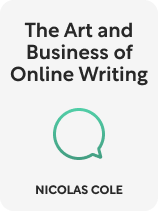

This article is an excerpt from the Shortform book guide to "The Art and Business of Online Writing" by Nicolas Cole. Shortform has the world's best summaries and analyses of books you should be reading.
Like this article? Sign up for a free trial here.
Are you struggling to turn your passion for writing into a profitable venture? Have you ever wondered how successful online writers build their businesses?
In his book The Art and Business of Online Writing, Nicolas Cole shares valuable insights on establishing an online writing business. He details strategies for transforming your writing skills into a lucrative career, including self-promotion techniques, creating pillar content, and monetization methods.
Keep reading to learn how to take your online writing hobby to the next level by transforming it into a business.
Establish Your Online Writing Business
Cole says that, once you’ve narrowed down your niche and have an audience, you can begin to turn your writing into a business—that is, to build a name for yourself and start making money from your content. To do this, you’ll need to direct people away from whatever platform they’re reading your content on (for example, Quora or Medium) and toward your personal platform—for example, a website or book. We’ll discuss how to establish an online writing business by capturing readers on your personal platform and profiting from this.
(Shortform note: While Cole says you must have a presence online and redirect your audience to your own platform to start making money, this isn’t always the case. In On Writing, Stephen King discusses the more traditional method of submitting your work to publications and getting an agent. If you’d prefer to take this traditional route, King recommends reading Writer’s Market—a guide to publishing all types of content from novels to plays. This will direct you toward publications and agents that fit your niche and that are looking for writers. It also provides information on pay rates and short descriptions of what each publication or agent is looking for.)
Step #1: Endorse Yourself
Cole says the first step in directing people toward your personal platform is learning how to endorse yourself without being obvious about it. Being low-key is crucial, according to Cole, because the more you endorse yourself the less people listen. The key to endorsing yourself is doing so in a way that genuinely benefits your reader.
For example, imagine you’re writing a piece titled “5 Signs Your Depressed Partner Is Unhappy With Your Relationship.” You can subtly endorse yourself by saying: “If you recognize these signs, you may want to have a conversation with your partner about existing issues.” Within that sentence, you can hyperlink to another article you wrote about how to have a conversation about relationship issues, which both helps the reader and plugs another one of your articles.
Cole says it’s OK to be more obvious sometimes—for example, directly saying that you wrote a book that might help your reader, or mentioning you’re an expert on the topic and they might want to check out your library. The key to doing this is making it clear that it’s for their benefit.
| Employ Ethos, Pathos, and Logos to Capture Readers In Thank You For Arguing, Jay Heinrichs says the best way to subtly persuade people to do what you want (click your link) is to employ ethos, logos, and pathos. To make this technique most effective, employ it throughout your article, not just when you reference your source. Ethos shows your audience that you’re inherently trustworthy and makes them want to listen to you. You can employ ethos by showing that you share the same values as your audience, demonstrating that you don’t have any personal stake in their decisions, and showing that you’re a practical person. This will make them willing to consider clicking your link. Logos uses your audience’s logic and beliefs to make your suggestion seem desirable. This is the technique Cole relies on when suggesting you make it clear how your link benefits the audience. Pathos leverages your audience’s emotions and is the most important aspect because it takes the audience from just agreeing with your offer to actually engaging with it; in other words, your audience will not only believe your link’s helpful, but they’ll actually click on it and read your content. You can employ pathos through storytelling or referencing shared identity that evokes feelings of tribalism. |
Step #2: Write Pillar Pieces
Next, Cole says you must create “pillar pieces” that attract people to your personal platform. For example, if your niche is “relationship management for people with depression,” your pillar piece will be an ultimate guide to this topic containing all the crucial information you’ve written about in different articles. This piece might cover topics like how to know if you have depression when you’re in a relationship, behaviors and feelings you might have, how to talk about relationship issues, and so on. Your pillar piece should include even more information and details than the individual articles combined—for example, additional research, personal stories, or interviews.

———End of Preview———
Like what you just read? Read the rest of the world's best book summary and analysis of Nicolas Cole's "The Art and Business of Online Writing" at Shortform.
Here's what you'll find in our full The Art and Business of Online Writing summary:
- The two things you must do to create a successful online writing career
- How often you should publish online
- Where to post your content for maximum impact






